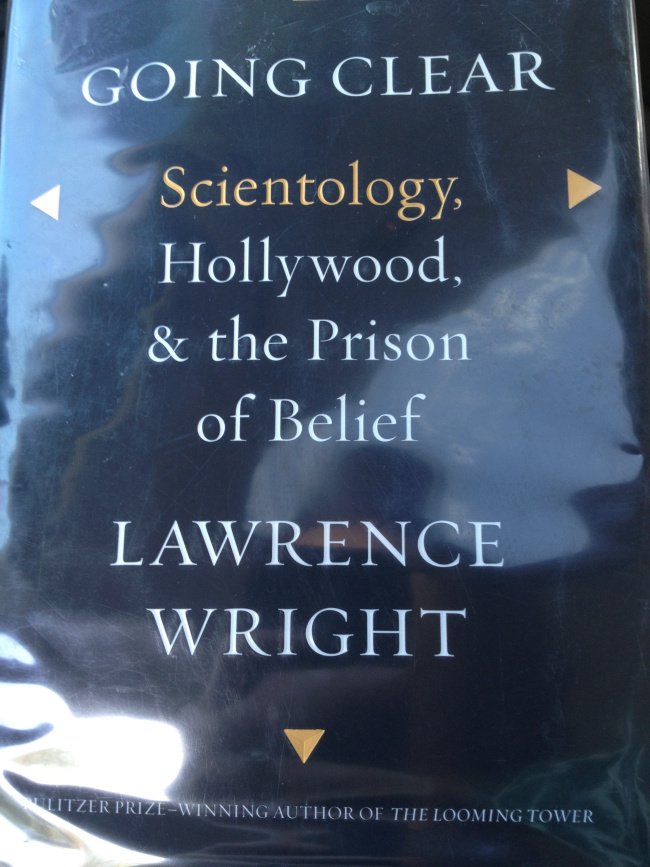So this week, I read Going Clear as part of a my In Real Life book club. This is my first real meeting as a member of said klatch, and you know how things are kinda awkward while you’re figuring out what people in your book club are like? Well, turns out mine are smart and like to read interesting things. Apparently, no one told them that I love conspiracy theories and cults in advance, so that’s allegedly a happy accident. Allegedly.
My weird obsession with Scientology began in 2009 when I was briefly bedridden and had tons of time to think about reptilians, Elvis, and staged moon landings. I find the church pretty terrifying, but also believe that everyone’s religious beliefs (including my own) sound kind of weird when overly reduced. Really, Xenu and thetans and whatever aren’t weirder than the prophesy of a zombie carpenter or the contents of stone tablets from the sky or the notion that we were possibly all grains of rice back in the day, so we should just live and let live. Well, you know, Lawrence Wright disagrees and makes a solid case for why.
I first came across Lawrence Wright’s stories about Scientology in The New Yorker a few years ago. I was comletely glued to it; his writing style is at once dense and accessible, smart, but not smart alec-y. If you haven’t read that article, I recommend you start there. It’s a long study of Paul Haggis‘ public split with the Church in 2009 and will give you a pretty workable framework for what this book is going to be like.
Scientology, for the uninitiated, is a relatively new religion that holds the writings of L. Ron Hubbard to be gospel. The dude was a remarkably prolific science fiction writer. He had a bunch of marriages, wrote millions (not exaggerating) of words, and had a brief and disastrous stint in the Navy. He was also deeply, wildly distrustful of psychiatrists and the government and was exceptionally paranoid. So there’s that. Wright opens his book by discussing the life and times of Commodore Hubbard, who I imagine must have been terribly charismatic, because a looker he was not. Even dedicated readers of conspiracy blogs and magazine articles probably don’t know this much about him; I certainly didn’t.
From there, Wright shows us how the Church got from the pen of Hubbard to calling Matt Lauer glib, making a strong case for “these people are legitimately abusive lunatics who prey on the lonely and pimp out their most attractive members for good PR.” Wright’s spectacular use of footnotes and endnotes is on full display as he does this; hundreds of people allege abuse at the hands of clergy (and worse), and every footnote is a fact-checked, non-litigious, snide-as-hell “the Church contends that Mr. Miscavige has not abused anyone ever.”
The third section is about all the weird celebrity stuff, allegations of wrongdoing, high-profile departures, and what happens next. This is the particularly compelling stuff: $10,000 dinners, missing person cases, titanium-plated motorcycles, blow drills, Operation Snow White, cruise ships, Tom Cruise. I couldn’t put it down. It’s here that Wright makes his case that we can’t just say, “well, there’s a lid for every pot” and look away from the Church of Scientology. In the United States, the Constitution allows for a wide definition of “religious expression” and affords substantial latitude to organizations that are deemed religions. Tax exemption, unpaid labor, etc., etc., etc. If Wright’s extensive research is to be believed, there are substantive human rights abuses going down (to say nothing of sheer jerkiness, stalking, blackmail, and extortion), and the powers that be are allowing them to occur because this was termed a faith rather than a money-making venture in the 1970s.
Overall, this was a fascinating, brilliantly researched, deeply weird story that makes for riveting reading. I tore through it in a couple hours, forgoing sleep and socializing to know for sure what the foregone conclusions were.
So did you read this? You should. If you do, you can come to my book club and have the clear-themed snacks I’m going to make.
Next week, I’m going to read this. Want to join up?
